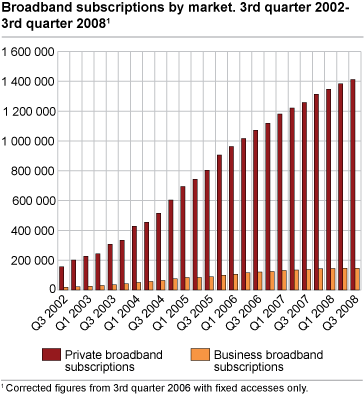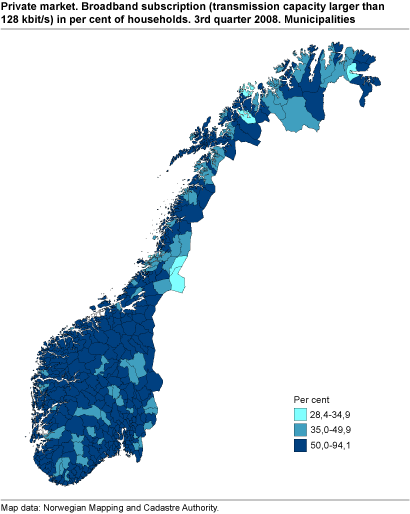Content
Published:
This is an archived release.
Broadband subscriptions with fixed access only
Corrected figures show continued growth in broadband subscriptions with fixed access only. Two out of three Norwegian households have such Internet access.
The number of broadband subscriptions with fixed access on the Norwegian mainland was 1 558 000 at the end of the 3rd quarter of 2008; an increase of 12 per cent in the last twelve months. At the end of the 3rd quarter, Norway had 1 412 000 fixed private broadband subscriptions and 147 000 business subscriptions. From this quarter onwards, the mobile broadband access will be removed from the figures. The statistics from the 3r d quarter of 2006 have been corrected to cover fixed access only.
Continued growth in fixed household broadband subscriptions in the whole country
The broadband penetration rate in private households is now 67.1 per cent. The figure for private broadband subscriptions per 100 households varies between 74 per cent in the county of Akershus and 55 per cent in the county of Finnmark.
Most private high capacity access
Twelve per cent of private broadband subscriptions have a download capacity higher than 8 Mbit/s. Only 4 per cent of business broadband subscriptions have such a high speed capacity. The number of low speed broadband subscriptions less than 512 kbit/s is less than 1 per cent in the private market and 7 per cent in the business market.
| Centrality1 | Broadband subscriptions |
Broadband subscriptions
in per cent of households |
|||||||||||||||||||||||||||||||||||||
|---|---|---|---|---|---|---|---|---|---|---|---|---|---|---|---|---|---|---|---|---|---|---|---|---|---|---|---|---|---|---|---|---|---|---|---|---|---|---|---|
| Remote municipalities | 112 878 | 57 | |||||||||||||||||||||||||||||||||||||
| Fairly remote municipalities | 78 755 | 63 | |||||||||||||||||||||||||||||||||||||
| Fairly central municipalities | 230 175 | 64 | |||||||||||||||||||||||||||||||||||||
| Central municipalities | 989 488 | 69 | |||||||||||||||||||||||||||||||||||||
| 1 | 1 Centrality 2008, Municipalities 2008. |
The most central municipalities have the highest number of broadband subscriptions relative to the number of households. While the number of broadband subscriptions relative to the number of households is 69 per cent, the corresponding figure for less central municipalities is 57 per cent.
Only six municipalities have fewer than 35 private broadband subscriptions per 100 households. This number has increased from three as a consequence of dropping the mobile broadband access from the figures. The mobile broadband access was highest in the two counties with the lowest broadband coverage but the measured differences between counties were rather insignificant.
| Municipalities |
Broadband subscriptions
in per cent of households |
||||||||||||||||||||||||||||||||||||||
|---|---|---|---|---|---|---|---|---|---|---|---|---|---|---|---|---|---|---|---|---|---|---|---|---|---|---|---|---|---|---|---|---|---|---|---|---|---|---|---|
| $Average for all municipalities | 67.1 | ||||||||||||||||||||||||||||||||||||||
| 0941 Bykle | 93.8 | ||||||||||||||||||||||||||||||||||||||
| 1252 Modalen | 90.8 | ||||||||||||||||||||||||||||||||||||||
| 1121 Time | 86.7 | ||||||||||||||||||||||||||||||||||||||
| 1151 Utsira | 86.7 | ||||||||||||||||||||||||||||||||||||||
| 0219 Bærum | 86.2 | ||||||||||||||||||||||||||||||||||||||
| 0544 øystre Slidre | 84.0 | ||||||||||||||||||||||||||||||||||||||
| 1046 Sirdal | 82.5 | ||||||||||||||||||||||||||||||||||||||
| 0215 Frogn | 81.4 | ||||||||||||||||||||||||||||||||||||||
| 1601 Trondheim | 81.1 | ||||||||||||||||||||||||||||||||||||||
| 0213 Ski | 80.7 | ||||||||||||||||||||||||||||||||||||||
| 0217 Oppegård | 80.5 | ||||||||||||||||||||||||||||||||||||||
| 1018 Søgne | 79.3 | ||||||||||||||||||||||||||||||||||||||
| 0228 Rælingen | 78.4 | ||||||||||||||||||||||||||||||||||||||
| 1563 Sunndal | 78.3 | ||||||||||||||||||||||||||||||||||||||
| 1221 Stord | 77.9 | ||||||||||||||||||||||||||||||||||||||
| 1122 Gjesdal | 77.7 | ||||||||||||||||||||||||||||||||||||||
| 0926 Lillesand | 77.1 | ||||||||||||||||||||||||||||||||||||||
| 1244 Austevoll | 76.8 | ||||||||||||||||||||||||||||||||||||||
| 1804 Bodø | 76.8 | ||||||||||||||||||||||||||||||||||||||
| 1502 Molde | 76.6 | ||||||||||||||||||||||||||||||||||||||
| 1130 Strand | 76.5 | ||||||||||||||||||||||||||||||||||||||
| 0211 Vestby | 76.4 | ||||||||||||||||||||||||||||||||||||||
| 1246 Fjell | 76.0 | ||||||||||||||||||||||||||||||||||||||
|
The mobile broadband access was removed because this part of the statistics has not been complete and because these subscriptions cannot be distributed geographically and by download capacity in the same way as the fixed access subscriptions. The Norwegian Post and Telecommunications Authority also compiles statistics on these mobile subscriptions but without information about the geographical location or download capacity. A few small, but locally important Internet service providers, mostly cable-TV providers, are still not included in the survey. Efforts have been made to include these providers. Some small errors related to the distribution of subscribers between municipalities may occur. This may have major consequences for the figures per household for some municipalities. Individuals and businesses may have several Internet subscriptions and several individuals may use the same subscription. The number of subscriptions is therefore not equivalent to the number of households/businesses with Internet access. A household can for instance get Internet access through an employer, educational institution or by sharing access with other households. The survey ICT in households provides more information about households with at least one member under the age of 75 with Internet access. For more information, see About the statistics. |
Tables:
- Table 1 Private broadband subscriptions. Subscription by transmission capacity and county including Svalbard. 3rd quarter of 2008
- Table 2 Business broadband subscriptions. Subscription by transmission capacity and county including Svalbard. 3rd quarter of 2008
- Table 3 Development features. Broadband subscription by market. Active subscriptions only. The whole country without Svalbard
- Table 4 Broadband subscriptions (larger than 128 kbit1
Contact
-
Statistics Norway's Information Centre
E-mail: informasjon@ssb.no
tel.: (+47) 21 09 46 42


